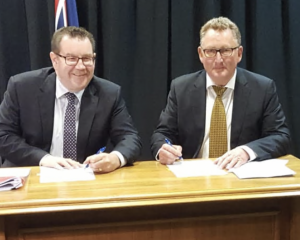
Māori initiatives are again getting more than $1 billion from this year's Budget, including $299 million towards health reforms.
It comes after a record $1.3b package last year, but with the health package representing just over 2 per cent of total health funding there are likely to be questions over how it seeks to address longstanding inequities.
But Associate Minister of Health (Māori) Peeni Henare said he was confident the funding would support the work that needed to be done.
"What Māori have always wanted is a health system that takes care of them.
"Māori deserve to live longer and healthier lives, and that is why this Government is reforming our healthcare system, and why we established a new Māori Health Authority as part of the reform."
Budget 2022 spends $188.1 million over four years to the Māori Health Authority. This is for direct commissioning of services and more support for Iwi-Māori Partnership Boards and to ensure the voice of iwi and whānau is strongly represented across the new Māori healthcare system.
This year's Māori Budget package builds on the Government's previous spending in areas like health, education, employment, economic development, tamariki, and whānau wellbeing.
Budget 2022 also spends $166m in Whānau Ora commissioning activities to continue supporting about 40,000 whānau.
This includes whānau who will be provided more intensive support through Ngā Tini Whetū, a joint agency support programme with ACC and Oranga Tamariki.
The Government will spend another $200 million in this Budget on Māori education initiatives, Associate Minister of Education Kelvin Davis said.
"We will continue to invest in growing a strong and capable workforce for our Māori-medium and kaupapa Māori sector in partnership with iwi and Māori," he said.
"Our support includes $47 million for the Māori language programme funding at its highest level of immersion (level 1), with funding given directly to kura to address the needs of their ākonga and whānau."
The Budget also allocates $28m over four years to intellectual property, genetic resources and international forum.
"Protecting mātauranga Māori and taonga is key in preserving the uniqueness of Aotearoa," Associate Minister for Māori Development Nanaia Mahuta said.
The Government has also committed $162m to whenua Māori entities to transition to lower-emissions land uses, reduce biological emissions and develop a Māori Climate Action Plan.
This includes $35m in agriculture emissions reduction funding, $36m to strengthen mātauranga-based approaches to reducing biological emissions, $16.3m for an Equitable Transitions Programme, $30.5m Māori Climate Action and $11.6 for the Takutai Moana –Implementation of Engagement Strategy.
The Pacific package contains funding to build up to 300 homes over the next 10 years for Pacific families in Eastern Porirua. Initial funding of $49m is for the forecast period.
A total of $49.9m goes to the Pacific Provider Development Fund, to support Pacific providers to adapt their models of care into the new health system, and $20m to implement a diabetes prevention and treatment programme for targeted Pacific communities in South Auckland.












